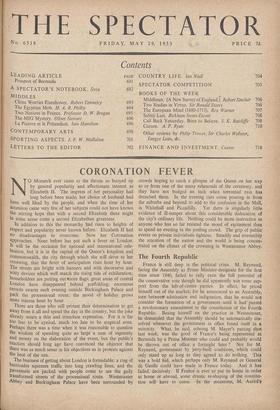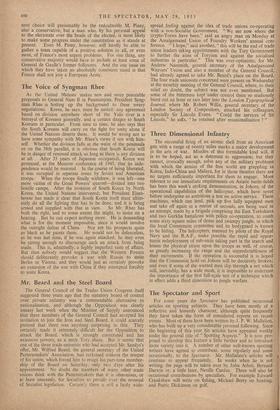The Fourth Republic
France is still deep in the political crisis. M, Reynaud„ facing the Assembly as Prime Minister-designate for the first time since 1940, failed to rally even the full potential of the conservative vote though he did apparently win some sup- port from the left-of-centre parties. In effect, he priced himself out of the market; for he announced to an Assembly, torn betweeav admiration and indignation, that he would not consider the formation of a government until. it had-passed a revolutionary amendment to the constitution of the Fourth Republic. Basing himself on the practice in Westminster, he demanded that the Assembly should be automatically dis- solved whenever the government in office found itself in a minority. What, he said, echoing M. Mayer's parting shot last week, was the good of France's being represented at Bermuda by a Prime Minister who could and probably would be thrown out of office a fortnight later ? Not for M. Reynaud, government by jerry-built coalitions, which could only stand up as long as they agreed to do nothing. This was a bold bid, which perhaps only M. Reynaud or General de Gaulle could have made in France today. And it has failed: decisively. If France is ever to put its house in order at home or abroad, some drastic re-shaping of the constitu- tion will have to come. In the meantime, M. Auriol'S next choice will presumably be the redoubtable M. Pinay, also a conservative, but a man who, by his personal appeal to the electorate over the heads of the elected, is most likely to make some progress under the constitution as it stands at present. Even M. Pinay, however, will hardly be able to gather a team capable of a positive solution to all, or even most, of France's most urgent problems. For one thing, any conservative majority would have to include at least some of General de Gaulle's former followers. And the one issue on which they have taken an absolutely consistent stand is that France shall not join a European Army.



































 Previous page
Previous page